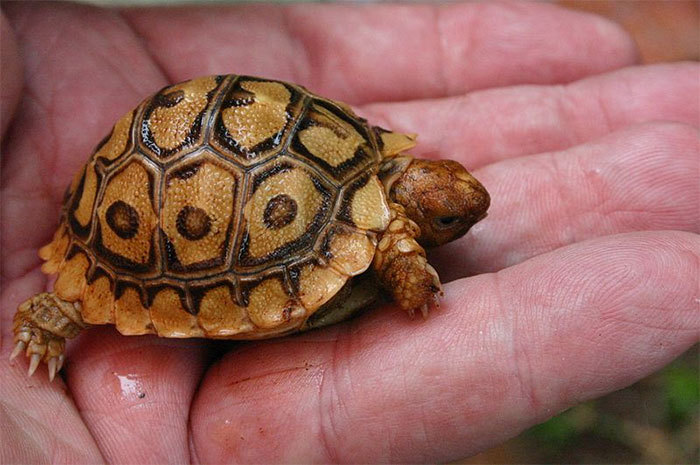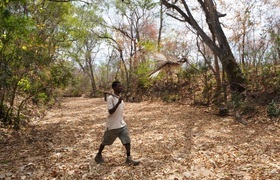No easy solutions to wildlife trafficking
29 May 2015 | Story by Newsroom
There are no easy solutions to the growing scourge of international wildlife trafficking and the illicit trade in rhino horn and ivory. All too often, law enforcement efforts in countries that are directly affected stop where borders begin, allowing transnational syndicates to operate with impunity.
These were among the central themes in the third of three Wildlife in Crisis seminars hosted at UCT by the Global Initiative Against Transnational Organised Crime in conjunction with Conservation in Action.
Time and again the "wrong people" are brought together to debate possible solutions said John Sellar – an anti-smuggling, fraud and organised crime consultant, and former CITES law enforcement chief.
Wildlife crime has been discussed at dozens of conferences in dozens of cities but law enforcement officials – the people on the frontlines – are invariably excluded from gatherings of politicians, researchers, environmental activists and bureaucrats discussing ways to stop the slaughter.
"Millions have been spent bringing the wrong people together," he said. "It is time for action and we need a new set of players around the table.
"I earnestly believe that reaching senior managers and policy makers in the law enforcement community is long overdue. They need to be convinced of the vital role they have to play. It is they who ought to be designing, adopting and implementing strategies to deal with organised crime, not politicians, organisations or campaigners."
Sellar added that the heavy focus on military strategies and anti-poaching operations was misguided. "The cop in me makes me believe that military strategies should only be temporary. Military strategy may stop the killing but not the trafficking ... Every time a rhino is killed or an elephant's tusks are smuggled across a border, we have lost a battle. If you focus too much on anti-poaching you are not going to win the war."
The real issue, he said, is crime. "Wildlife trafficking is going to go on relentlessly until we either bring the people controlling it to justice or we make it too risky for those people to profit from it.
"We have to get people around world who deal with organised crime on board. Can it really be that simple? I believe it can."
Bonaventure Ebayi, director of the Lusaka Agreement on Cooperative Enforcement Operations, said that wildlife crime in Africa should be seen "as a socio-economic problem". Wildlife crime is depriving developing economies of billions of dollars in lost resources and development opportunities.
It poses a threat to national and international security, leads to the transmission of zoonotic diseases, degrades ecosystems, leads to a dramatic loss in biodiversity, undermines the rule of law and negatively affects the livelihoods of rural communities.
More countries need to share information, there needs to be an increase in the number of countries with strong legislation to curb poaching and wildlife trafficking, and there is a need for improved technological responses to poaching.
According to Paula Kahumbu, a Kenyan activist and CEO of WildlifeDirect, "we need to reinvent ourselves" to tackle wildlife crime.
"There is an enemy out there and the enemies are the poachers with guns, bows and arrows, snares."
Referring to the often fractious debate over legalised trade in rhino horn and ivory, she said: "We come into these meetings and act as if we are fighting with each other, but we are all on the same side ... Deep down we all believe in the protection of this magnificent wildlife heritage ... We must go to war with those who threaten our heritage ... We need to win the hearts and minds of everyone in Africa to support our heritage, eliminate supply of ivory, and extinguish demand."
In Kenya, the Hands of Our Elephants campaign – which she has spearheaded along with the country;s first lady, Margaret Kenyatta – is having an impact, she said. There has been public pressure on courts to impose stiffer sentences on wildlife criminals. "We were able to show that 70% of case files went missing in Kenya courts and while there was a 78% conviction rate [in wildlife cases] less than 4% of those convicted went to jail."
In January last year – as a result of public pressure – a new law was passed which allowed for a fine of around $170 000 or life imprisonment to be imposed in cases involving offences against endangered species
Kahumbu said there had been "major wins" in Kenya, with elephant poaching falling 50% and rhino poaching down by 40%.
She argued that if South Africa did decide to push for a re-opening of legal trade in rhino horn, the impact would be devastating. "Kenya will lose every one of her rhinos." She said she was "really afraid" that if a trade proposal was passed by CITES in 2016, it would undo demand reduction campaigns that have been trying to persuade buyers in Vietnam and China to stop buying rhino horn and ivory and will be "heaven for poachers".
Antoinette Ferreira, a specialist environment and organised crime prosecutor at South Africa's National Prosecuting Authority, said there will "never be an end to poaching in South Africa". While the country has "wonderful legislation" it is "not making a difference".
Corruption, she said, is the "thing that makes my job difficult".
"There are people infiltrated in every chain of command where enforcement is involved .....
"Sophisticated environmental crime networks are aided by government enforcement agencies that lack political and financial backing to do their job. This is compounded by a lack of adequate training for police and customs officials in many countries to deal with environmental crimes."
A minimum sentence of 15 years should be imposed in wildlife crime cases and there should be efforts to make it more difficult for wildlife crime suspects to obtain bail.
Paul Gildenhuys, who heads up biodiversity enforcement at CapeNature in South Africa's Western Cape province, said state coffers were overwhelmed with competing funding priorities and laws were fragmented, limiting enforcement efforts.
"It is essential that co-operation between countries is improved ... [and] there must be buy-in from all levels of government."
The impact of wildlife crime is not limited to charismatic species like rhino, elephants and lions. In the Western Cape, collectors and scientists have been implicated in smuggling rare colophon beetles, tortoises and plants including 80 000 proteas.
Effective law enforcement to curb a range of wildlife crime activities requires dedicated, specialist staff with adequate resources and funding and properly implemented legislation.
Story by Julian Rademeyer from the Global Initiative against Transnational Organised Crime.
|
UCT's Centre of Criminology together with the Global Initiative against Transnational Organised Crime and the Conservation Action Trust hosted Wildlife in Crisis, a series of expert lectures and discussions conducted over three evenings at UCT, from 18–20 May. Stay tuned for daily updates from the conference:Day 1: People and wildlife: a status report Day 2: Towards a solution Day 3: Enforcement and justice |
 This work is licensed under a Creative Commons Attribution-NoDerivatives 4.0 International License.
This work is licensed under a Creative Commons Attribution-NoDerivatives 4.0 International License.
Please view the republishing articles page for more information.










